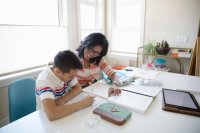How Parents Can Help Their Kids With Studying
Advice that teachers can share with the parents of middle and high school students about how to get the most out of time spent studying.
Your content has been saved!
Go to My Saved Content.Dear parents,
I’d like to give you some pointers for assisting your child with studying. As a parent of three children, I get it—this can be tough, especially when you don’t know the content well yourself. I have some advice on how to help, no matter how much—or how little—you understand about a subject.
I have a conversation with my students at the beginning of the year to stress these suggestions for healthier study habits, and I hope they also assist your child.
A Few General Points to Keep in Mind
Know when it’s time to reassess: In my AP Psychology class, I want students to actively engage with the material. This means discussing and questioning the learning, and relating what they do inside the classroom to their outside lives. Studying at home should be much the same, with students doing the heavy mental lifting involved with studying and recall—not the adult. If you’re doing more work than your child, it’s time to reassess and adjust.
Rereading is not always effective: While reviewing notes may yield some benefits, it’s possible that this time could be better spent, especially if students find themselves repeatedly reading the same paragraph. How many times have you read a paragraph only to realize you had no idea what you just read? This can happen to your child’s attention while reading, all the more so if phones or other distractions are around.
The fewer distractions, the better: Along these lines, try offering small rewards, such as a short break after a period of effort with no distractions. Keep in mind that, cognitively speaking, nobody can effectively multitask. If students are paying attention to a favorite show or song, or responding to a text, they cannot also be paying attention to the material.
So what can you do to help?
3 Ways to Help Your Child Study
1. Ask questions: Quiz students on the material. Provide as few hints as possible, which helps your child realize what they know and don’t know, while also eliminating a false sense of knowledge that can accompany guessing correctly. Guessing isn’t necessarily bad, but you don’t want your child to develop a false sense of mastery. Question the reasoning of a specific answer. Have students answer correctly multiple times before moving on.
2. Discuss stumbling blocks: Ask your child to write down major concepts relating to the material. Have them explain their understanding to you without relying heavily on their notes. If they stumble, especially after you offer a small hint, this indicates that they haven’t mastered the material. Calmly ask your child to explain their confusion. Often, discussing stumbling blocks helps students recover and move on.
If this tactic fails, ask your child to write down everything they think they know about the material. I call this a “brain dump,” and I often ask students to do this before leaving class. At home, they try to recall as much as possible from the exercise. This might help jog their comprehension.
3. Ask recall questions when possible: With multiple choice, matching, and fill-in-the-blank questions—three forms of recognition questions—students must recognize the correct response from a corresponding word bank. If you have access to these kind of questions—in a textbook’s unit review, for example—you should avoid them. Recall questions are more challenging, involving no hints. One way to turn a recognition question into a recall question is to ask your child the question without providing the possible correct responses.
If your child flounders, try asking them to explain everything that they can recall about content related to the question. Often they’ll stumble upon the correct response while also recalling other important details.
Strapped for time? I sympathize with busy parents. When you cannot help out, remind your child to remove distractions, quiz themselves, and take short breaks during long study sessions.
The more we—students, teachers, and parents—use these recommendations, the better chance students have for developing more efficient and effective study habits. And usually, better study habits mean more learning, better grades, and more productive, happier, more motivated students.
